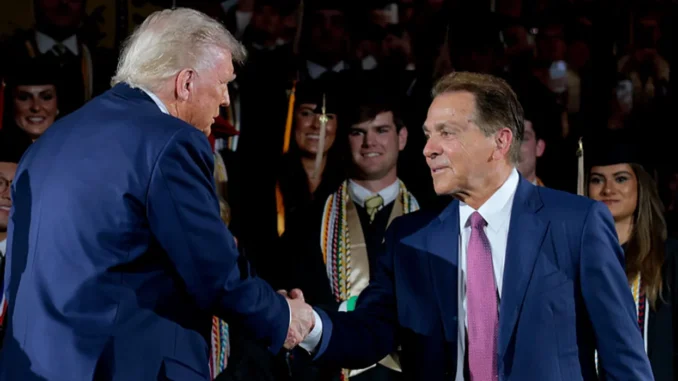
In a move that could shake the very foundations of college athletics, former President Donald Trump is reportedly considering an executive order to impose payment limits on NCAA athletes. This development comes on the heels of a high-profile meeting between Trump and renowned Alabama football coach Nick Saban.
The potential executive order, if realized, would mark a significant intervention by the federal government in the NCAA’s governance structure. Currently, the NCAA operates with a degree of autonomy, setting its own rules and regulations regarding athlete compensation. However, with Trump’s involvement, the landscape could change dramatically.
Coach Saban, known for his conservative views and influential stature in college football, is said to have played a pivotal role in shaping Trump’s perspective on this issue. Saban’s meeting with Trump reportedly centered around the compensation of college athletes, with Saban possibly expressing concerns about the current system.
Proponents of payment limits argue that unrestricted compensation could lead to an uneven playing field, where wealthier programs would have a significant advantage over smaller schools. They also contend that paying athletes could blur the lines between amateur and professional sports.
On the other hand, advocates for athlete compensation argue that students who generate billions of dollars for their universities and the NCAA through their performances deserve a fair share of the revenue. They point out that current restrictions on athlete compensation are outdated and unfair.
If Trump were to issue an executive order imposing payment limits, it would likely face intense scrutiny and potential legal challenges. The NCAA, universities, athletes, and lawmakers would all have a stake in the outcome, and the issue could become a contentious debate about the future of college sports.
The potential implications of such a move are far-reaching. It could lead to a re-evaluation of the NCAA’s business model, potentially paving the way for athletes to profit from their name, image, and likeness. Alternatively, it could result in a more restrictive environment, where athletes are limited in how they can benefit from their talents.
As the situation unfolds, one thing is certain – the world of college athletics is on the cusp of a potentially game-changing shift. The outcome will have significant consequences for athletes, universities, and the NCAA, and will likely shape the future of college sports for years to come
Leave a Reply